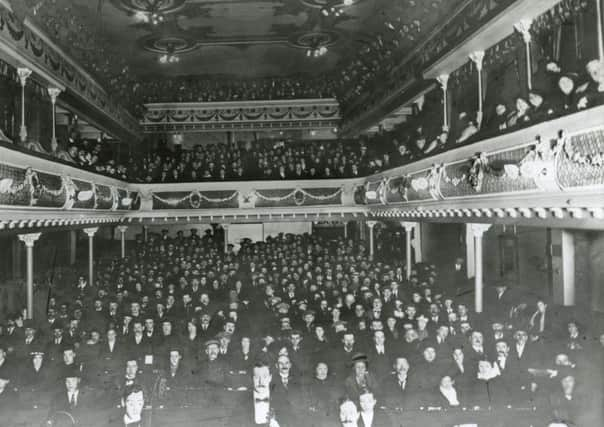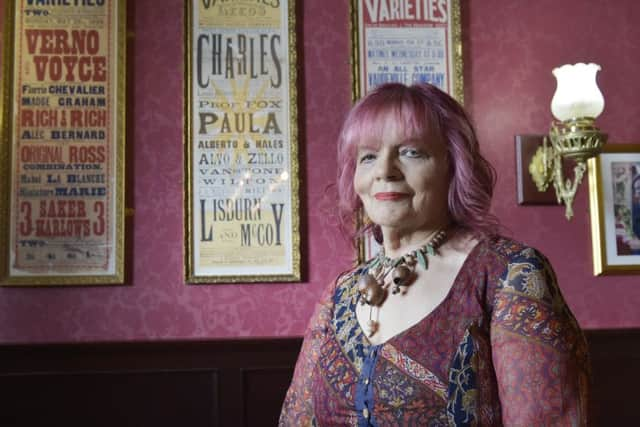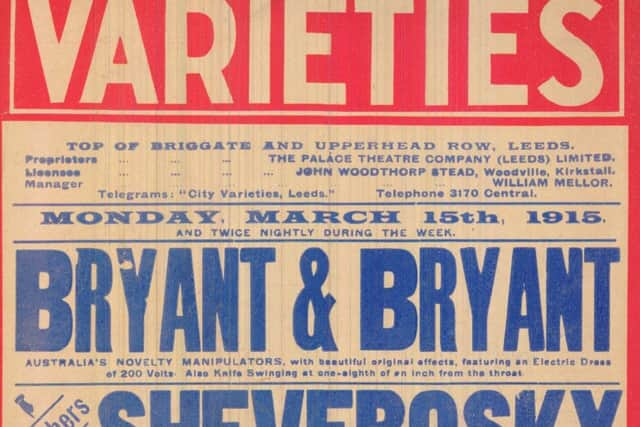The City Varieties during the Great War - light relief in dark days


By the time war broke out in August 1914 music halls, or variety “palaces” as they were sometimes glamorously called, were already beginning their slow decline following the advent of cinema.
But rather than accelerate their demise, the conflict saw them become increasingly important – not only as places where people could go and be entertained and forget about the daily grind, but also where they could see the latest war pictures.
Advertisement
Hide AdAdvertisement
Hide AdMusic halls became important focal points for local communities across the country bringing some much needed light relief as the dark days of the war brought increasingly sombre news back home.


To mark this year’s Remembrance Day, and the 99th anniversary of the Armistice, a new stage production is being performed at the world famous City Varieties, in Leeds. Those Were The Days features actors ranging in age from six to 60, and blends history and entertainment with theatrical style and a good dollop of northern humour. Leeds-born writer and director Liz Coggins is the creative brains behind the production and says the idea was to celebrate Leeds and “its people, its culture and, importantly, its theatres.”
However, she admits it was born out of frustration over the commemorations marking the centenary of the start of the war which she felt glossed over the North. “There wasn’t much spotlight on places like Leeds and what there was seemed very shallow,” she says.
Those Were The Days is a homage to the stars of the day such as Marie Lloyd, Vesta Tilley, Florrie Ford and, of course, Charlie Chaplin, and celebrates comedy sketches from the era as well as famous songs, performed by the cast, such as the Marrow Song, Yes! We Have No Bananas and It’s A Long Way To Tipperary.
Advertisement
Hide AdAdvertisement
Hide AdDespite the emergence of cinemas, the old music halls were still popular and could be found on practically every corner in the centre of Leeds. “Music halls were the heart of the culture of the working classes; people would gather and sing, drink and laugh together and forget their troubles; when war broke out this didn’t stop – in fact it became even more important,” says Coggins.


Many of the characters in the show are based on real people and from stories handed down to her over the years. “I wanted to put a spotlight on Leeds and surrounding areas like Burmantofts and Quarry Hill because you had such fascinating people living there,” she says.
Many of the stories were tinged with tragedy. “There was a lady, a piano teacher, who went to the same church as us in Leeds when I was little and I asked my mother why she was dressed head to toe in black, and she told me that she’d lost her sweetheart in the First World War. It was stories like this that stayed with me.
“The war played such a huge part in people’s lives. I spent a lot of time with my grandparents growing up and my gran used to tell me about working at Arthur’s making clothes and intertwined with this would be stories from the war, like the vicar’s daughter losing her fiancé, and when I started putting this together I wanted to show how all this affected ordinary people.”
Advertisement
Hide AdAdvertisement
Hide AdHer own grandfather, Harry, fought in the war with the 15th Service Battalion West Yorkshire Regiment – better known as the Leeds Pals – and she pays tribute to them in her stage show. “The Leeds Pals did their initial recruiting at Elland Road and also at the City Varieties. They had a variety show and then gave a recruitment speech and the men would actually go up on stage and enrol. It happened at theatres and sports grounds all around.”


The Leeds Pals, her grandfather included, were among those that fought at the Battle of the Somme in 1916, suffering terrible losses. Her grandfather survived but thousands didn’t. “There’s a line my grandma used to say, ‘there’s not a house in New Church Place that hasn’t got its curtains drawn’ and that was straight after the Somme because nearly everyone lost somebody,” says Coggins.
With the onset of war music halls like the City Varieties were commonly used to drum up support for the war effort. The well known music hall performer Vesta Tilley visited venues across the country singing patriotic songs and encouraging men up on stage to sing along with her. They would then be presented with papers to sign up for the war which most of them did rather than lose face in front of so many people. It led to Tilley being sarcastically referred to as Britain’s ‘best recruitment sergeant’.
Despite playing an integral role in the heart of the community during the war, the records as to who performed at the City Varieties during this period, and when, are sketchy. “What we do know is it stayed open during the duration of the war,” she says.
Advertisement
Hide AdAdvertisement
Hide AdCatherine Hayward, learning manager at the City Varieties. “We have playbills from the outbreak of the war going on well into 1915 and then they start to dry up.”


One surviving poster from that year has Bryant and Bryant, dubbed ‘Australia’s Novelty Manipulators’, topping the bill followed by the Sheverosky brothers. What’s interesting to note are the words ‘latest war pictures’, halfway down the bill, which act as an inescapable reminder of the conflict engulfing the nation at the time.
The crew of HMS Victory appeared at the City Varieties and among the many music hall acts that performed there in 1915 were Tom and Kitty Major. They might have slipped from the memory if it wasn’t for the fact that Tom later became father of a future prime minister, John Major.
“There was a mixture of music and song and dance and we see more comedies and farces with a military theme, though we don’t know if these continued as the war went on and the scale of the casualties became more apparent,” says Hayward.
Advertisement
Hide AdAdvertisement
Hide AdAs the war dragged on the Varieties staged a growing number of benefit concerts for orphans and families of soldiers killed in action. It also provided audiences with updates from the Front. “There was a projector called the variscope and as well as live performances the theatre could show pictures and short films. So it was somewhere that people could come to catch up with news from the Front and see the latest pictures.”
For Coggins, the story of the City Varieties is entwined with that of the people of Leeds. “Those who lived through the Great War are no longer with us,” she says. “But I don’t want these stories to die with them. Our history is important to our understanding of the present day and that’s why it’s important these stories live on otherwise they become consigned to the dull pages of history.”
Those Were The Days is on at the City Varieties, Leeds, November 11, at 7pm. Tickets are priced £19.60. Call 0113 243 0808.